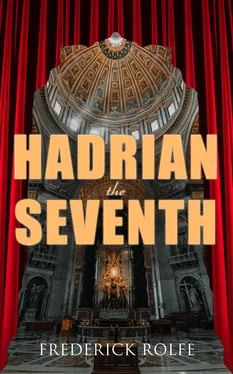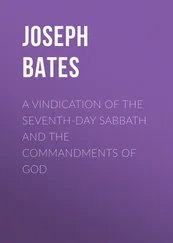George detected himself in the very act of affixing a label to a nation. He brought down his will with a thud on his critical faculty. The bishop looked at the cardinal, suggesting that Mr. Rose was accustomed to smoke over his meals.
"Don't you find it bad for the digestion?" the cardinal inquired in the tone of an archbishop to an acolyth. An access of genial gentlehood, and something else, to which George at the moment was unable to put a name, suddenly infused his manner when he had spoken.
"I don't think I have a digestion. At least it never manifests itself to me."
"Happy man!" the cardinal exclaimed to no one in particular: adding, "Well perhaps we might go upstairs; and Mr. Rose can have his cigarette and listen to me at the same time."
The room to which they went was a private cabinet, a very vermilion and gold room, large, airy, princely. The cardinal took a long envelope from the bureau.
"I think you will find that correct, Mr. Rose," he said. "You had better open it before we go any further."
The contents were a blank cheque book, and a bank-book containing Messrs. Coutts's acknowledgment of the credit of ten thousand pounds to the current account of the Reverend George Arthur Rose.
Notwithstanding his natural hypersensibility, that peculiar individual did not become the plaything of his emotions until some time after the event which brought them into action. At the moment when blows or blessings fell upon him, he rarely was conscious of more than a crab is conscious of when its shell is struck or stroked. Later, when he deliberately set himself to analyse consequences, all his senses throbbed and tingled. But, at first, he was wont to act, on the impulse certainly:— but to act. Having acquainted himself with the contents of the envelope, he took out his beloved Waterman, saying.
"I'm sure Your Eminency will let me have the pleasure of writing my first cheque here."
He handed to the cardinal a draft for five thousand pounds, payable to bearer. It afterwards occurred to him that he could have taken no more cynical way of testing the reality of his fortune. He felt ashamed of himself, for he hated cynicism. The act itself merely was the act of a man awakening from a vivid dream and automatically doing what he had resolved, before falling asleep, to do. In effect, it was by way of being a pinch of a kind to himself. There was no doubt whatever but that it was a pinch of another kind to the cardinal. Followed alternatively disclaimers, stolidity, embarrassment, humility, unction: the cheque went into the bureau, the cheque-book and the bank-book into the pocket of George's jacket.
And now, what was the extent of his theological studies? His general knowledge of course was unexceptional: but special— knowledge theology? Well, in Dogma he had done the treatises On Grace —"a very difficult treatise, Mr. Rose"— and On the Church —"a very important treatise, Mr. Rose";— and in Moral Theology he had read Lehmkuhl, especially On the Eucharist and On Penance ,—"nothing could be better, Mr. Rose." These had been the subjects of the professorial lectures at Maryvale. During the years which had elapsed since then, he had read them again and again, until he thought he had them at his fingers' ends. As for Cardinal Franzelin's De Ecclesia (that was the Maryvale text-book), he found it one of the most fascinating books in the world. In fact, it was a regular bedside book of his: and by this time he knew it by heart. Being a man of letters, of course he would like to enlarge it a little, to put a gloss upon it here and there, perhaps even to expand the thesis at certain points. St. Augustine's Encheiridion was another favourite book. And St. Anselm's Cur Deus Homo was another. His reading was extensive and curious: but, sad to say, desultory and unsystematic, because undirected. He had read the standard works as a matter of duty: but he had made a far more exhaustive study of obscure writers. The occult, white magic bien entendue , was intensely interesting, the book on Demoniality by Fr. Sinistrari of Ameno, for example. Perhaps it would be desirable for him to tabulate the sum of his studies, that His Eminency might decide whether to have him examined in those or to submit him to a fresh course.
"Quite unnecessary, Mr. Rose. And now touching the matter of ceremonial."
He had made a point of mastering Martinucci, practice as well as theory. It was astonishing what a lot could be done with a guide-book, a few household-implements, and imagination. He was aware that he had practised under difficulties: but a few rehearsals beneath the eye of an expert— —
"And Canon Law?"
"Nothing at all."
"Well, well, just those few treatises in Dogmatic and Moral Theology in particular, and a large amount of random reading in general. Of course the Grace of God can supply all our deficiencies. I myself— Things which are hidden from the wise and prudent oft-times are revealed unto— oh yes! Well, Mr. Rose, it is not a large, or, humanly speaking, an adequate equipment for— for the priesthood, certainly. But we must consider the years which you have waited. Yes. Well, perhaps we had better waste no more time now. Go home and pack your bag: and come and stay with me for a little till we can settle on your future. I shall give you the subdiaconate tomorrow morning; and you can arrange to say your first Mass on Sunday in the cathedral."
"My first Mass must be a black mass, Eminency."
The cardinalitial eyebrows would go up.
"It is a long-planned intention, Eminency: it is all I can do."
"I quite understand, Mr. Rose. You would wish to say your first mass quietly and alone. You shall say it in the private chapel. The Bishop of Caerleon would like to be your assistant; and— ha— I shall be very glad if you will allow me to serve you."
George looked from the cardinal to the bishop; and back again. After storm, this was calm and peace, with a vengeance.
Table of Contents
What was causing the special correspondents in Rome to exude the subterfuges, with which (as a pis-aller ) they are accustomed to gain their daily bread, was no such recondite matter after all.
Just as Jews are less commercial, and Jesuits less cunning, so journalists are less capable than they are supposed to be. As a matter of fact, they are quite unscientific persons, in that they go about their business in a fortuitous manner trusting to the human element called "smartness" for producing their effects. They have not yet realized the instability of all human elements. The superhuman is a sealed book to them. They mean oh so well: but they have no knowledge of first principles. They invariably commit the unpardonable error of confounding universals with particulars: because the influence of fragile or unworthy authority, customs, the imperfection of undisciplined senses, and concealment of ignorance by ostentation of seeming wisdom, are as stumbling-blocks which obstruct their path to Truth. Add to this a lack of sympathetic intuition and of an historical knowledge of their subject. They take no end of pains to acquire a fluid style of writing; and it may be admitted that, within their limitations, they can describe the superficies of almost anything which may be shoved under their noses. But, as for giving a scientific description (under such heads, for example, as the Material, Formal, Efficient, and Final Causes), so that one can derive a satisfactory understanding of the thing described,— that is beyond their power.
And, as for proceeding in a scientific manner, whether by means of the liberal or the so-called occult arts, to what on the whole is the essence of their business, viz. the collection of news, why Sir Notyet Apeer's young men, or Sir Uriah Tepeddle's criminal-investigators, or the "yearnest" exoletes who fill the Daily Anagraph with food for literary lionlets and Roman Catholic clergy and nonconforming philanthropists, have no such adequate ideal of their branch of literature. Their aim is to please editors or proprietors; and, so, to earn an as-near-as-may-be-legally honest living. No more.
Читать дальше











